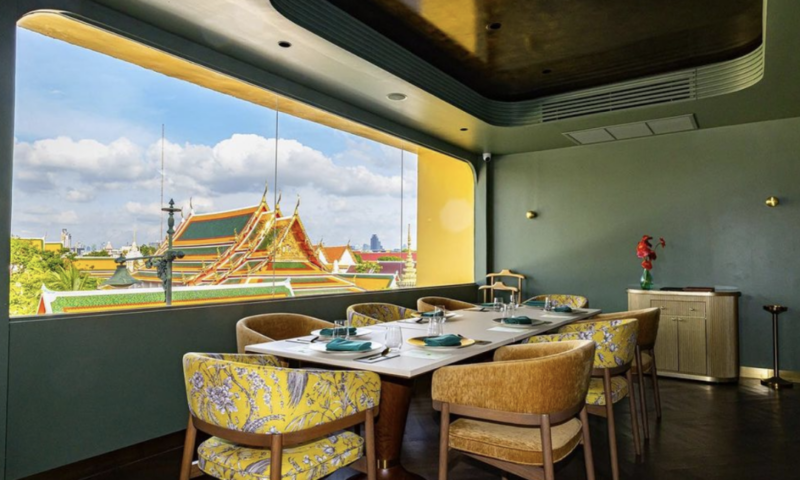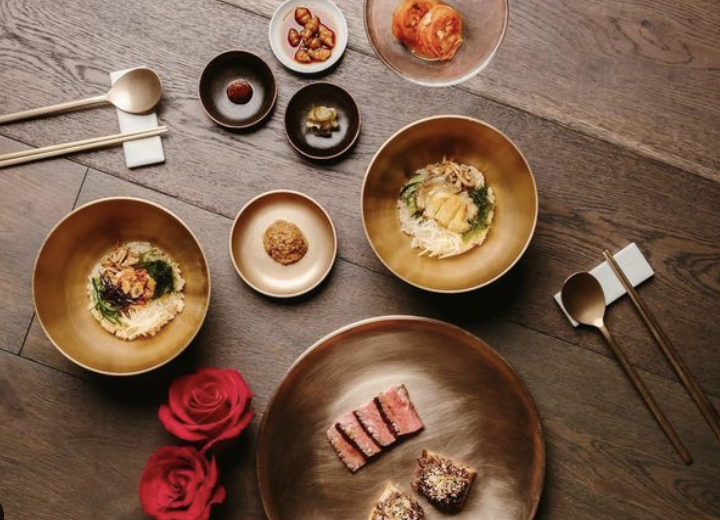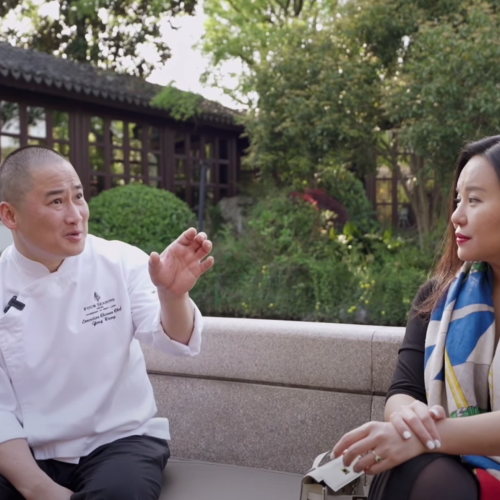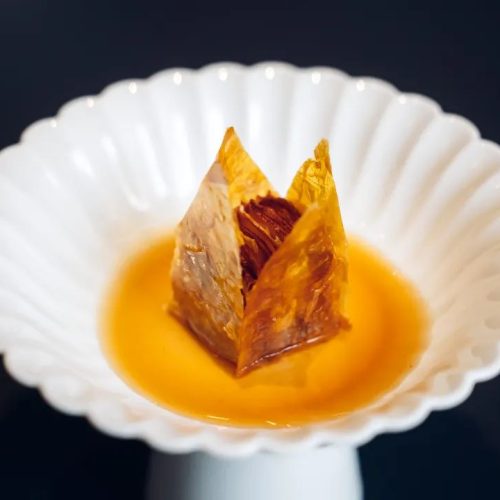Author: Jocelyn Chen
The F&B industry in China was almost tragically stalled by the coronavirus pandemic in the first few months of last year, but one business has seemed to see crowds increasing – bistros. The city of Shanghai has an early history of nurturing western-style bistros predominantly run by local foreigners. But recent years have seen them become a stage for young Chinese returnees, who have sniffed the huge potential of China’s food and beverage market. They know too well that selling wine is only part of the game, while heart-soothing cuisines must add to the whole lot.
Shanghai wouldn’t be Shanghai without the entrenched bistro landscape. Back in the old days, bistros were usually flocked by foreigners, but now things have changed. Shanghai bistros have raised the bar on food to fine dining standards and quality, and my awe pretty much goes to Wine Universe by Little Somms since its opening fanfare. The passion wine bar offers much-coveted Domaine de la Romanée Conti (DRC) BY THE GLASS to lure customers and quickly rose to fame a couple of years ago. DRC is something irresistible for wine lovers, which means it is irresistible for me. Apart from being professional in curating the wine list, the bar boasts an impressive food menu as well.
Young returnees with persistence in food and wine
Adapting to local tastes is integral to the success for bistros, whose owners are overseas graduates and have returned to China to start their own business. I spoke to Jasper from Wine Universe by Little Somms, Jeffrey from Bar à Vin, and Li Ze from OTTiMO. As sommeliers and chefs themselves, the three have solid understanding of wine, and food as well. Their bistros serve not just western snacks, but a variety of creative finger food that goes perfectly with drinks, such as Chaoshan lou-mei (sauced cold meats) and pickled pepper chicken feet from Yuzhilan restaurant.
Graduated from SHMS Hotel Management School in Switzerland, Jasper (Sun Xin) did internship in three-starred Michelin Epicure and one-starred restaurant Le 114 Faubourg in Paris. Runner-up in the 2018 Southern French Best Sommelier Competition and winner of many other sommelier awards, he is now the founder and chief executive of the By Little Somms group. Having enjoyed substantial success in 2018, the group has by far expanded to a total of eight locations in Shanghai and Xi’an.




Jeffrey, the owner of Bar à Vin
One reason for the strong performance was word of mouth, which due one part to Peter’s people skills, but the flexibility and freedom on food and wine options are largely helpful as well. Rules for dishes to make to the menu are simple – attainable, minimum preparation, easy to store and fast to serve.




OTTiMO ushered in its rebirth under the hands of its new owner, Li Ze. A well-known sommelier, Li originally aspired to become a chef when he was young. He passed the exam to learn cooking skills at a culinary school in China. And he could still recall the dish – Spanish mackerel in tomato sauce which he cooked for his parents the day he graduated from that school.

Li Ze, the owner of OTTiMO
He later went to the UK to study hotel management, during which time he did internship at the Dorcherster Hotel in London. His professional career officially started soon after he became a full-time sommelier at the same hotel. First job after returning to Shanghai was sommelier as well, before which he worked as international buyer at a wine trading company that promoted him as a star sommelier.



“Just like girls want to have their own cafe, for sommeliers, it’s wine bar,” Jeffrey said, “I am not the kind of person who easily settles. For me, getting my own restaurant and bar up and running is just something natural.”




OTTiMO is the fourth bar he holds ownership to. Given the Italian restaurant name, yet there is a lot more than just Italian food for guests to expect. The venue is a bit more spacious than the normally-compact bistros. Highlighting a variety of seafood choices, the restaurant aims to create laid-back holiday moods as if enjoyed on the sunny beaches by the southern coast of France. His four restaurants have different positioning strategies. With the concept of minimal intervention going big, Vinism is Shanghai’s first natural wine bar with Chinese-style appetizers. SOiF is another natural wine bar but focuses more on French and Nordic inspired appetizers. OTTiMO is a bistronomic combination of Mediterranean seafood dishes, tasty wines, and craft cocktails. The late-coming DELi is an interesting spot for sandwiches, a bunch of alcoholic drinks and coffees.
Against the tides on coronavirus: Shanghai bistros jazz up the catering playbook
As Jasper said, people’s well-grounded appetite for bistros needs to be satiated. This I wouldn’t disagree. My personal dining habits say either fine dining restaurants or casual eateries serving a good deal at about 200 RMB for one. The kind of restaurants that I am least willing to go to is those that cost you about 400-500 RMB. These restaurants offer food and service on par for their sake price wise, but a couple notches over in terms of quality. And this usually comes with disappointing wine options. Now with robust specialty dishes, bistros fill the niche by just enough booze to avoid being soulless, but not so much that they charge an arm and a leg for a glass.


The signature dish Standing-scale Snapper with Black Garlic Mayonnaise and Marseille Fish Sauce is deliciously impactful and savory thanks to the extremely perfumed sauces. The pairing wine, the famed Domaine Tempier Rosé from Provence, is citrus, nutty, beautifully acidic with spicy and woody afternotes, complementing the saffron sauce.

Octopus Legs with Almond and Red Pepper Sauce is a classic Galician dish from Spain. Romesco sauce made by sherry vinegar offers a unique blend of fresh flavours and acidic complexity. A nice alternative wine is the delightfully refreshing coastal white Albariño that grows on the lower bay in the same area. It’s loved for its rich stone fruit aroma, a hint of minerality, and zippy acidity.
I asked the three of them what main reasons are needed for their bistro business to survive the pandemic. Jasper considers the main reason to be the downgrade in Chinese workers’ shifting spending habits on quality goods at an affordable price. Although bistros are not necessarily cheap, they do have inexpensive options. The second reason, social distancing policies. Compared with regular restaurants, bistros are relatively limited in seating, which makes them perfect venues to dine out with less crowd density. Jeffrey, on the other hand, attributes the strong performance to be the result of an increasing population of wine drinkers.

Jasper, the owner of Wine Universe By Little Somms
Strong identity is at the core of everything
Shanghai’s flourishing bistros do not guarantee good quality for everybody. Solid group resources are needed for bistros to look for competent chefs and carry out systematic training to bring up delicate cuisine and generate value profits. But bistro food does not require as much intricacies as fine dining restaurants. Copying is easy, and losing identity is easier. Bistros will have to carve and maintain what has made them different from others. In addition, customers tend to spend much more on drinks than on food in bistros, which is an obvious difference to fine dining restaurants.
Jasper wouldn’t let this happen. He said that the next step is to explore niche market where maybe Chinese appetizers like Cantonese-style snacks and dim sum can be offered. In addition, the group may resort to inventive wines created by local experts to amaze its customers. Jasper may be young, but this man has the vision of an entrepreneur. High likelihood that he is going to be the next figure driving the country’s bistro industry.
My idea is that bistros will be one of the driving wheels of China’s F&B industry in the future five years. Jasper’s business has extended to lower-tier cities of Chengdu and Xi’an and has been leading the local trends. It’s only a matter of time for substandard bistros to get phased out during post-lockdown, and new leaders will rise to take the place.
As Jeffrey said, Shanghai’s bistro industry has experienced some dynamism. Li Ze commented about the booming bistros: “I don’t particularly appreciate crowded dining environment, but it doesn’t hurt to check out economical places where there are plenty of wines and quality dishes. J’ai Soif! (I’m thirsty) Customers would love to see more adorable bistros where they could just chill and relax in cities throughout China.”

Reprint or other cooperation matters
Please contact WeChat account:tastytrip2020
Welcome to follow us
Weibo:TastyTrip
Instagram:_tastytrip_










